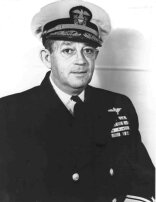|
 Clifton A. F. “Ziggy” Sprague enters World War II as the commanding officer of the seaplane tender Tangier when the Japanese suddenly attacked the American Pacific Fleet at Pearl Harbor on December 7, 1941. The situation on that dramatic day in American history was, to say the least, extremely chaotic. With conflicting orders bombarding the American ships’ commanders and reacting to the relentless Japanese attacks, Cliff Sprague remained calm. His coolness under duress was one of the many outstanding characteristics of this highly competent and charismatic naval officer. His ship was the only one to maintain an effective fire against the attacking Japanese aircraft. Although bombs and torpedoes came close to the Tangier, it managed to survive the Pearl Harbor raid untouched and remained fully operational. Also, because of Sprague’s training regimen on the Tangier, the crew was fully prepared to go to General Quarters and defend their ship against the Japanese assault. His penchant to fully train his crew to prepare them for battle would carry forward through the dramatic confrontation that would take place off the Philippine Island of Samar on October 25, 1944. Clifton A. F. “Ziggy” Sprague enters World War II as the commanding officer of the seaplane tender Tangier when the Japanese suddenly attacked the American Pacific Fleet at Pearl Harbor on December 7, 1941. The situation on that dramatic day in American history was, to say the least, extremely chaotic. With conflicting orders bombarding the American ships’ commanders and reacting to the relentless Japanese attacks, Cliff Sprague remained calm. His coolness under duress was one of the many outstanding characteristics of this highly competent and charismatic naval officer. His ship was the only one to maintain an effective fire against the attacking Japanese aircraft. Although bombs and torpedoes came close to the Tangier, it managed to survive the Pearl Harbor raid untouched and remained fully operational. Also, because of Sprague’s training regimen on the Tangier, the crew was fully prepared to go to General Quarters and defend their ship against the Japanese assault. His penchant to fully train his crew to prepare them for battle would carry forward through the dramatic confrontation that would take place off the Philippine Island of Samar on October 25, 1944. 
Immediately after Pearl Harbor, Sprague took the Tangier on several missions that included a failed attempt to supply Wake Island (due to the vacillation of the then acting Pacific Fleet Commander, Vice Admiral William S. Pye) and moving supplies to the newly established American bases in Samoa and New Caledonia. While in New Caledonia, he applied highly effective diplomatic skills working with the French authorities there. Just before the Battle of the Coral Sea in May 1942, Sprague relinquished command of the Tangier and assumed a new assignment as operations officer for Rear Admiral James L. Kauffman, commanding officer of the Gulf Sea Frontier headquartered in Miami, Florida. 
During his assignment in Florida, Sprague directly influenced the development of powerful convoying techniques for protecting Allied convoys plying their way along the American Gulf and Eastern coasts from marauding German submarines. He supervised a vast increase of escort vessels which led to more convoys and more ships safely reaching England. The ability of greatly increasing the volumes of war materiel to the European theater and substantially reducing the U-boat threat was a key factor that led to the successful landing of Allied soldiers on the Normandy beaches on June 6, 1944. 
Sprague was promoted to the rank of Captain and awarded the command of a new Essex-class aircraft carrier under construction, the Wasp, in November 1943. After supervising its construction, he took her out for her shakedown cruises. As always with a new ship, many technical problems popped up that Sprague and his crew took in stride. Sprague repeatedly demonstrated his competence for command and won the respect of the Wasp’s crew. The ship’s newspaper, Waspspirit, reported the shakedown cruise was “the first opportunity for many of the crew to see [Sprague’s] now familiar figure on the bridge, directing the course of the Wasp . . . And all hands had that feeling of complete safety that comes only with utmost confidence in their leader.”
Cliff Sprague served with great distinction as the Wasp’s commander in the Central Pacific island-hopping campaign and in the Battle of the Philippine Sea (also known as the Marianas “Turkey Shoot”). Because of his outstanding performance as the big carrier’s captain, he achieved the lofty rank of Rear Admiral to command a group of escort carriers in the invasion of the Philippines. It was there that his small force of six escort (or “Jeep”) carriers, three destroyers, and three destroyer-escorts -- known as “Taffy 3” -- stood up against the might of the Japanese Fleet and saved the lives of thousands of sailors and soldiers on the beaches of Leyte Island. 
During his command’s heroic stand against an overwhelmingly powerful force, Sprague displayed the same coolness and discipline under incredible stress and made some of the most incredible decisions that saved his small force from certain annihilation. For his role during the decisive Battle off Samar, Sprague becomes the most important senior naval commander in this largest of all naval battles -- The Battle of Leyte Gulf. 
|
